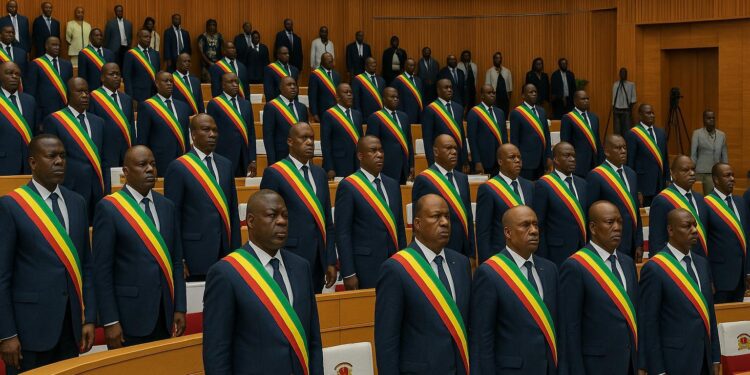Session Overview
In Brazzaville on 15 August, Speaker Isidore Mvouba lowered the gavel on the ninth ordinary session of Congo’s National Assembly, urging deputies to “shadow the government at every step,” a boxing metaphor underscoring the chamber’s resolve to intensify democratic oversight without hampering executive momentum.
His comment was echoed by First Vice-President Léon Alfred Opimbat, who argued that enhanced scrutiny would ‘strengthen rather than weaken policy delivery,’ a line later repeated by state television Télé Congo, reflecting broad institutional support for a more data-driven parliamentary culture.
Over forty journalists attended the closing ceremony, a sign of rising public interest in legislative affairs after years dominated by executive announcements (Africanews, 16 August 2025). Analysts view the trend as part of a continental movement toward institutional balance rather than an abrupt political shift.
National Assembly Oversight Drive
Mvouba’s oversight message focused on debt viability, budget execution and the investment climate, three pillars also stressed in the government’s 2025–2027 National Development Plan. He urged committees to publish quarterly scorecards so that ministries would feel, as he put it, ‘the warm breath of scrutiny’.
Constitutional scholars in Brazzaville note that Article 138 already empowers the Assembly to summon ministers, yet the tool has been sparingly used. By re-endorsing the provision, Mvouba signals continuity with President Denis Sassou Nguesso’s own calls for ‘responsibility and results’ in public administration.
Efficient Legislative Output
Thirty-two items reached the floor during the three-month session; deputies adopted twenty-seven, an efficiency rate of eighty-four percent that compares favorably with continental averages reported by the Inter-Parliamentary Union. Most bills passed unanimously, suggesting robust pre-plenary negotiation rather than rubber-stamp voting.
Notably, two private-member initiatives advanced: one modernizing copyright law to align with the African Continental Free Trade Area’s digital provisions, and another creating a national observatory for climate volatility. Observers hailed the proposals as evidence that back-benchers are beginning to shape the policy agenda.
Health Infrastructure Gains
Legislators endorsed the transformation of district hospitals in Sibiti and Ouesso into full general hospitals, clearing the way for presidential inaugurations slated for the final quarter of 2025. Health Minister Gilbert Mokoki said the upgrade would ‘cut referral times by half’ in the remote Lékoumou and Sangha departments.
The move aligns with the National Health Development Plan 2023-2030, co-financed by the World Bank and the African Development Bank, which prioritizes secondary-level facilities to relieve Brazzaville’s congested referral centers (World Bank press release, 11 April 2025). Mvouba commended deputies for ‘matching words with budgets.’
Strengthening Bilateral Tax Cooperation
Deputies also ratified the Congo-Türkiye Double Taxation Convention, signed in Ankara on 14 November 2024. Finance experts say the accord will cap withholding taxes at competitive rates, facilitate customs data exchange and reinforce investor confidence amid Congo’s push to diversify beyond hydrocarbons (Anadolu Agency, 14 Nov 2024).
Turkey’s ambassador, Hilmi Ege Türe, told reporters the convention ‘eliminates fiscal friction for our small and medium enterprises.’ The agreement dovetails with President Sassou Nguesso’s 2030 diversification strategy, which aspires to double the share of manufacturing in GDP within five years.
Reforms Aligned with CEMAC Roadmap
Beyond individual bills, the session’s tempo reflected Congo’s commitment to the CEMAC-IMF reform matrix, which targets prudent borrowing, payroll rationalization and domestic arrears clearance. The latest IMF Article IV report credited Brazzaville for ‘decisive steps,’ yet urged faster subsidy targeting (IMF report, May 2025).
Mvouba reminded deputies that parliamentary endorsement is vital to unlock the remaining US$120 million under the Extended Credit Facility. Economy Minister Ingrid Olga Ghislaine Ebouka-Babackas later confirmed that two performance criteria hinge on statutory audits, giving legislators a concrete role in securing external financing.
Diplomatic Resonance and Investor Outlook
Foreign embassies followed the session closely. The European Union envoy, Giacomo Durazzo, privately welcomed ‘the Assembly’s renewed activism,’ while the Chinese mission highlighted hospital votes as proof of ‘our shared development vision.’ Such remarks hint at the forum’s growing weight in diplomatic briefings.
On the domestic front, business chambers saw symbolic value in the rapid passage of bills. ‘It signals predictability,’ commented Cédrik Ibata of the Congolese Employers Federation. Market analysts expect yields on five-year treasury bonds to ease marginally if the oversight push curbs fiscal slippage.
Perspectives on Parliamentary-Government Synergy
Political scientist Pamela Mouissou argues that the Assembly’s assertiveness remains ‘cooperative rather than adversarial,’ a nuance consistent with the country’s semi-presidential architecture. She predicts that regular ministerial question-times, once institutionalized, could boost policy feedback loops and improve the calibration of social programs.
For now, deputies disperse to their constituencies with a clear mandate to supervise, legislate and communicate. Many will return early for the extraordinary budget session in October, where the effectiveness of their new oversight ethos will meet its first test amid complex regional headwinds.
Civil society coalition Observatoire Citoyen du Budget plans independent scorecards of oversight. Coordinator Armand Bika argues the initiative will ‘deepen accountability chains’ and equip voters with data before the 2027 legislative polls.












































